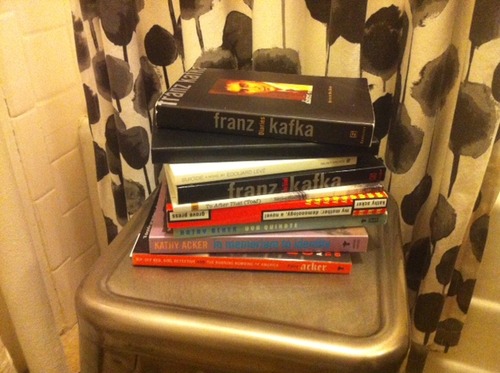
Sheila Heti: Okay, let’s talk about what we have here. Four Kathy Acker books. Suicide by Edouard Levé. To After That—who’s the author? Two Kafka books, and a black book that looks like a journal.
Kate Zambreno: Oh, To After That is one of my favorite contemporary novels, by Renee Gladman, that I’m teaching this semester at Sarah Lawrence. A slim novel in which the writer meditates on the failure of a past unpublished book. I love that book—keep returning to it. I love how subtle and meditative it is.
SH: Do you keep it in the bathroom because you like to open it up randomly and just enjoy the sentences, or why is it there?
KZ: I only keep books in the bathroom when I’m in the bathtub. Our bathroom is really humid and everything gets wet really easily. So those were just the books that I was dragging in to look at that day (probably a couple weeks ago?). Have been thinking a lot about Kafka lately, so was looking at his journals. Thinking about Kafka’s feelings about being a writer. The Levé Suicide I had finished that day—read it all in one day and found it such an enormous and sly feat, this second-person meditation on a past friend who killed himself, and then the extra text of that book, how Levé then killed himself a few days afterwards. So with that book I was looking at it longingly and just picking it up and thinking, how did he do it? how did he produce something so sly and marvelous and also strangely joyful? Acker is for an essay I’m late on writing, for an anthology on her works, so I drag them everywhere in the hopes that I’ll start working on the essay.
SH: So how long would you say that pile remained like that for? Just the day?
KZ: That pile remained like that for a day, yeah, until the next time one of us needed to shower. I keep the books on a stool that I drag in from the other room.
SH: You say you’ve been thinking about Kafka a lot lately. What have you been thinking about him?
KZ: I’ve been thinking of ideas of disappearance and ego in the figure of the writer historically. How Kafka was obviously a genius writer who steadily worked on his journals, stories and novels, producing them somewhat through autobiography, but also how he wanted to destroy his writing or not publish it. I’m also interested in Kafka as a writer who in some ways used the self...
You have reached your article limit
Sign up for a digital subscription and continue reading all new issues, plus our entire archives, for just $1.50/month.
Already a subscriber? Sign in




